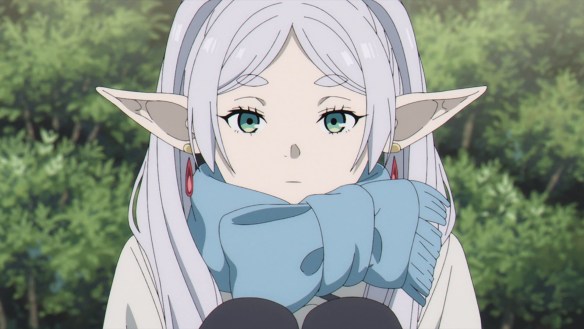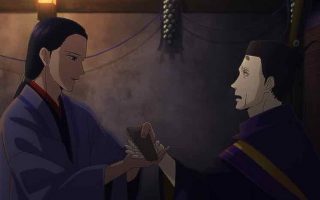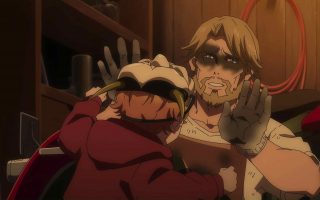Hello folks, and welcome back to Wrong Every Time. Today I’m delighted to announce we’re returning to the rambling adventures of Frieren and her companions, as they continue north towards the land of the dead. I admit, I may have kinda-sorta written ahead of my commissioned episodes previously, meaning it’s been a couple months in real time since I last checked in with Frieren. But that actually seems perfectly aligned with the show’s own timetable – for just as I was bunkering in for winter during the last couple episodes, so too am I now anticipating the first days of spring, staring out at the melting snow just as Frieren and company tramp through the same.
Frieren’s mastery of atmosphere and sense of tangible place have always been its strongest features, but our last episode complimented them with some poignant Stark-centric reflections, using the legends of both Himmel and Stark’s brother Stoltz to interrogate the measure of great deeds and worth of a life. The actual reality of Himmel facing the sword in the stone was immaterial; he chose not to define himself as the hero who failed, and his successful commitment to his own values led history to remember him as such. Similarly, while Stoltz was renowned as a warrior so gallant he slew foes without tarnishing his white cloak, what Stark remembers are the moments he willingly knelt in the mud, ensuring his brother felt safe and loved in his presence. Conducting yourself so as to theoretically impress future generations is a fool’s game; history will reveal or conceal as it will, and what truly matters is how you are remembered by those you cared about, by the people who walked beside you and knew the truth of your heart.
With Stark newly assured that those he journeys with care about him just as his brother did, we continue onward into the vast unknown. To the north!
Episode 13
We open on Frieren doing her usual blank stare and hunched-over posture as she meets a human man on the road. Frieren’s defensive body language and general lack of expressiveness do a fine job of visually illustrating her awkwardness, though it’s true that most characters in this show have a somewhat reserved affect. The contrast of small eyebrows and big ears is also very distinctive and charming
The man reveals he dreamed of being an adventurer long ago, but that was just the idle fantasy of a boy
“Aversion to One’s Own Kind”
We touch down in the Alt Woods, a grand valley of high shrubs and conifers stretched between two sloping mountain ridges
Our traveler reveals he had a friend with whom he shared dreams of adventuring, who at one point asked him to join on his travels. “That was ten years ago. I still regret it.”
In the usual youth adventure model, “adventuring” is a robust metaphor that tends to stand in for generally embracing life’s opportunities, seeking out new experiences and taking risks, that you might fill your memories with bold reflections and seize any passion you discover along the way. Little surprise that the reflective Frieren would take this metaphor to its endpoint, centering characters who feel like they missed their chance at whatever adventure their life could have contained, and who must learn to live with their compromises, with never knowing who they might have become. It is good to encourage the young to seize every chance, but we inevitably pass by doors that we regret not opening, and exploring living with those consequences is just as vital a topic of drama
Excellent deadpan cut as we reveal the reason for this man’s story: he is currently sinking in a bottomless swamp, and would very much like Frieren to save him
Deadpan humor, particularly deadpan visual humor with no further signifiers, is a tricky thing to pull off, as it demands expertly conducting the viewer’s attention and expectations before pulling the rug. Done poorly, it simply comes off as incongruous; but as demonstrated both here and in Bocchi the Rock, Keichiro Saito is an absolute master of establishing visual expectations and then subverting them, a product of his collective understanding of framing and timing. I haven’t seen a better manipulator of wordless anime comedy outside of Kyoto Animation
“I’m trying to remember the spell to pull someone out of a bottomless swamp.”
It takes Fern’s arrival to free him. They play it for laughs, but Frieren’s teetering on the edge of amorality is a fundamental part of her character; her great character flaw is that she’s lived too long, long enough to no longer see the vitality of a single brief life
As usual, the backgrounds depicting this new village are lovely, demonstrating an easy confidence in arraying and designing a convincing medieval community. None of Frieren’s settings look like unbelievable videogame locales; they all appear as they were built naturally over time, taking advantage of the local features of their environment
Excellent sound effect as Stark immediately gets bit by a venomous snake
They elect to transport him back to the village. Love how Frieren just lazily hangs him from her broom, carrying him by the collar like a cat carrying its baby by the neck
They are directed to Sein, the man they rescued earlier, who is apparently the brother of the local priest. He also turns out to be a healing genius, resolving Stark’s seemingly incurable venom with a brief gesture
Apparently Heiter gave his brother the holy symbol. Seems like this episode could be serving as a parallel to the last one, considering the significance of what we do versus what we are. Is this brother’s willingness to perform the role of priest more noteworthy than his brother’s mislaid talent? Are we obligated to follow our talents, even if they do not align with our dreams?
I suppose I’m lucky enough that writing is both the only thing I’m good at and the love of my life; that said, it would be even nicer if I could make a real living doing it!
As a boy, he wanted to be an adventurer, not a priest trapped in the same daily routine. As a man, he is now trapped in that routine without even the prestige of priesthood to show for it
The priest requests they take his brother along, but Frieren seems unenthusiastic about the prospect, calling it an “aversion to her own kind.” So does she not like to see her own passivity reflected in this man, who has spent his early life waiting for something to happen?
Stark meets Sein downstairs, asking him to join their party as Sein gambles with the locals
After some unfortunate gambling decisions, Sein declares he’s already missed his chance at adventuring. A decision that flies in the face of Frieren’s tardy decision to change her own nature, but which is perfectly understandable from the perspective of a human life. We can change our mindset, our philosophy, or our values, but our bodies keep aging all the while
Yep, as expected, Sein’s passivity reminds Frieren of her own attitude before Himmel and the others called her into action
“I deferred the decision for too long.” Perhaps a rational deduction, but just as often a self-assigned cage
And so she offers Sein the same words that Himmel offered her – whatever happened in the past can stay in the past, “I’m talking about the present”
He declines, to which Frieren responds “that told me everything I need to know. I don’t like you, Sein.” Frieren is not a particularly heroic character; she lacks empathy even relative to the average person, and frequently makes calls based on her uncharitable gut feelings or aversion to uncomfortable truths. She’s one of the least sympathetic characters in this narrative, which certainly makes for some interesting moral contrasts
“So I’ve decided you’ll join us, no matter what.” Still, she’s trying – she sees herself, and doesn’t like that self, but still wants to improve it
“I thought it might be nice to give someone the push they need, like Himmel the Hero did for me.”
As always, the true substance of life is contained in montage, as we watch Sein prepare for the village festival while dodging the party’s recruitment efforts
“They shine too brightly for these tired eyes.” To one who believes his chance of reinvention has passed, the opportunity of youth is too dazzling, too painful to bear
I like this running gag of Fern being vindicated regarding Heiter’s priestly alcoholism
When Sein’s friend didn’t return after three years of adventuring, he took it as a sign he was dead, and was content enough to let his own dreams die with him. We all claim to want only the opportunity to seek our dreams, but in truth, we are also very good at concocting reasons to delay or abandon them. It is a frightening thing to pursue what you believe to be your truest purpose – for if you fail or are misled then, what is left of you? At least if you leave your dream as a dream, it can never be tarnished, never be proven an idle fantasy
“It’s only been ten years. If you don’t go see him now, you’ll regret it in the near future. You’ll wonder if you could’ve made it in time if you’d gone now.” Practically the only subject Frieren is qualified to give advice on is her own regrets, but they’re certainly relevant here!
Sein reveals the truth: just as his brother stayed in this village to maintain a home for him, so must he protect this place in turn. There are vows and bonds that can become far stronger than our childhood dreams
His brother actually slaps him for this reasoning. He was perfectly content with his choice, while Sein demonstrates every day how unhappy he is being imprisoned in this village – does he think his brother wants that?
Later, Sein admits he’s defeated. “I’ll find him and make my stupid childhood dream come true.”
And Done
Thus the party sets off once more, now equipped with a priest of great ability and dubious conviction. Sein is certainly an appropriately ambiguous religious guide for our party, possessing basically none of the philosophic or moral conviction you’d expect from a spiritual leader, but practically bubbling over with uncertainty regarding the value or purpose of his own life. Still, his questioning of his future was a natural vehicle for letting Frieren vindicate her own past choices, and carry on Himmel’s legacy in a very personal way. The frustrating thing about life is that you can’t really appreciate how much you’re valuing your time in the moment – it is only later, looking back, that you can fully assess what was most important to you, and what you wish you had pursued. Still, as both Sein and Frieren demonstrate, a life is longer than you think, and certainly longer than our regrets would have us believe; you might have missed yesterday’s adventure, but surely you can still make time for tomorrow.
This article was made possible by reader support. Thank you all for all that you do.




